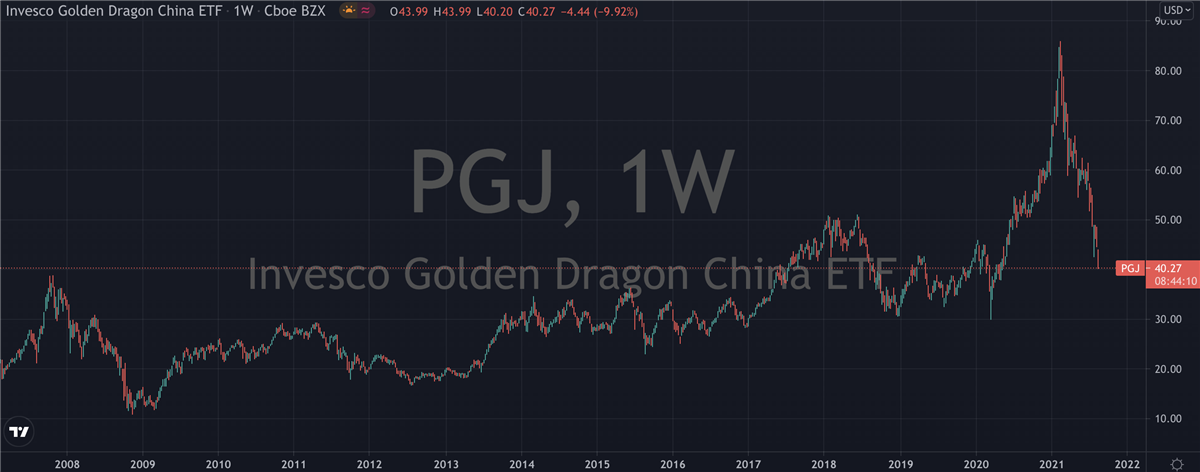What's Hot And What's Not In China Right Now? It's no secret that many Chinese stocks have been under significant pressure for the past six months. Despite most of the big names rallying through 2...
By Sam Quirke
Our biggest sale — Get unlimited access to Entrepreneur.com at an unbeatable price. Use code SAVE50 at checkout.*
Claim Offer*Offer only available to new subscribers
This story originally appeared on MarketBeat

It's no secret that many Chinese stocks have been under significant pressure for the past six months. Despite most of the big names rallying through 2020 and continuing to soar to all-time highs in the early months of this year, it's been nothing short of brutal since. The big driver behind the weakness is the Chinese government, which has launched a vicious regulatory crackdown that is spooking investors both in China, and further afield.
Their focus has swung from the online gaming industry to the private education sector, to its homegrown big-tech firms. Invesco's Golden Dragon China ETF (NASDAQ: PGJ), which holds US-listed Chinese stocks, has fallen more than 50% from its February high. Yesterday's session put paid to any feelings that the sellers might be running out of steam as it sunk another 5% to put it back trading at the same levels it spent much of 2017 at.
As we head into the final session of the week, let's take a look at two of the more well-known stocks and see where there might be some buying opportunities starting to open up. For sure there's volatility right now, but for investors with a long enough time horizon, these stocks and many of their peers are starting to trade at prices that are just too good to ignore.
Alibaba (NYSE: BABA)
Chinese authorities approved plans this week to roll out fresh data privacy laws as well as new unfair competition guidelines for tech companies. Understandably, these moves further dampened the appetite of investors to own Alibaba stock as both will potentially act as major brakes on the growth potential of one of China's largest companies. Their shares finished the day down close to 7% and at a new 52 week low.
But as we pondered two weeks ago, is now the time to start thinking about buying Alibaba shares? If you're a believer in the old adage that the time to buy is when there's blood on the streets, then it just might be. Their share price has been sliced in half since February and the stock's RSI is at 20, indicating extremely oversold conditions.
Their most recent earnings report showed revenue was still growing at 30% year on year, while management is confident enough about their future to be repurchasing shares at a terrific rate. Both of these are attributes of companies that deserve a place in any long term portfolio. And that's exactly the attitude any investor in China needs. Let's not forget, this is the company that's aiming to serve 1 billion customers a year by 2024.
Weibo (NASDAQ: WB)
Shares of Weibo have been trading sideways since the middle of 2019, which is when they stopped the 70% slide that had started the previous year. As one of the most popular social networks in China, they command a huge market presence and have all the hallmarks of a company that has yet to reach its full potential.
Their Q2 earnings, released this week, had revenue up 48% on the year and well ahead of what analysts had been expecting. The company also reported more than 500 million monthly active users, confirming the massive reach that Weibo has in the world's second-biggest economy.
Because of how much their shares underperformed their Chinese peers in the past two years, they've been left relatively unscathed from this current selloff. They've fallen 30% from their July levels but are still trading for around the same prices they were at in May, something the folks over at Alibaba would love to be able to say. Compared to its global social network peers, the stock is trading at a deep discount, and there's a strong argument to be made for starting to scale into a position at these levels. The stock's RSI is, like Alibaba's, suggesting extremely oversold conditions, and potential investors have some decent support around the $40 mark to work an entry and stop-loss.









